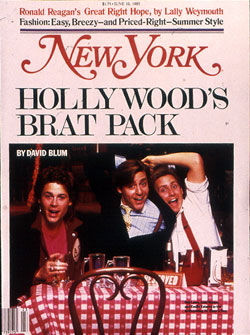 |
From the June 10, 1985 issue of New York Magazine.
It was a Thursday night, and like all the Thursday nights in all the bars in all the cities in all the world where young people live, the Hard Rock Cafe brimmed over with boys and girls. This was Los Angeles, so the boys wore T-shirts and sunglasses and shorts, and the girls wore miniskirts and Madonna hairdos. Over the blare of rock music, the boys and girls were shouting jokes and stories to one another, talking about their jobs and their classes and their dreams, eating enormous cheeseburgers and washing them down with swigs from long-necked bottles of Corona beer. The waitresses were dressed in punk uniforms, and they smiled and laughed as the boys and girls floated from table to table, partying with the endless spirit of those who have no place to return to, no person waiting nervously at home, no responsibility the next day that could possibly be more important than this night, right here, right now.
At one round table in the middle of the room sat a group of boys who seemed to exude a magnetic force. As the boys toasted each other and chugged their beers, the prettiest of the girls would find some excuse to walk by the table, and they would eye the boys as languorously as they possibly could, hoping for an invitation to join them. The boys knew that they had this force, and they stared back with equal vigor—choosing with their eyes the prettiest of the pretty and beckoning them with their smiles. Without fail, the girls would come, and they would stay, bringing with them all the charms they could muster. There were many boys in the bar that Thursday night, many of them as handsome as those at this one round table, but these boys—these young studs, all under 25 years old, decked out in Risky Business sunglasses and trendish sport jackets and designer T-shirts—they were the Main Event.
A girl named Alice straightened her long, white T-shirt over her blue skirt, brushed her jet-black bangs away from her eyes, patted her hips with her hands, and walked slowly to the table. She went to the handsomest of the group, the boy with the firmest chin and the darkest sunglasses. She knew that he was Rob Lowe and that he had been in The Hotel New Hampshire, and she probably also knew that he was involved with an actress named Melissa Gilbert, but from the open, white-toothed smile he gave her as she walked over, she felt confident.
“Hi,” she said. He took her hand and shook it.
“Nice to meet you,” he said.
“My name is Alice,” she said.
He did not tell her his name. He had already turned his head toward a pretty blonde who had just walked by and turned her head toward him. He flashed the blonde his open, white-toothed smile; she returned it and walked over to the table.
But by the time the blonde girl arrived, Rob Lowe had long since forgotten she was coming. He had turned back to the table, where his friends had once again lifted their bottles in a toast: For no reason, with no prompting, for what must have been the twentieth time of the night, the boys were about to clink bottles and unite in a private pact, a bond that could not be broken by all the pretty young girls in the room, or in the world, or even, perhaps, by the other, less famous young actors who shared the table with them as friends. As the bottles clinked, the boys cried together at the top of their lungs, “Na zdorovye!”—Russian for “good health,” but really something else, a private signal among the three famous boys that only they understood. After they finished their toast, the three boys turned their attention back to Alice and the other girls who surrounded the table, and smiled. The girls smiled back.
If Rob Lowe seemed to be inviting all too much attention from the girls, Judd Nelson acted as though he wanted nothing to do with it. His fame, too, helped attract them—they recognized his tough-guy looks from his role as the wrong-way kid in The Breakfast Club and sought his attention. But as Alice sat down in an empty chair next to him, Judd Nelson announced to anyone within earshot, including Alice, “There is a line. When someone crosses the line, I get angry. And when someone sits down at the table, they have crossed the line. You can let them get close”—he looked around at Alice and the swarm of girls—“but you can’t let them sit down.”